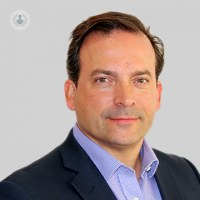Prostate cancer and all the treatment options available
Autore:If your prostate cancer has been diagnosed early, the chances of survival are generally very good. Treatment aims to slow down, shrink, or even cure the disease completely. However, there are many treatments to choose from, and although your doctor will advise you on the best one based on a variety of factors, the ultimate choice is yours.
Renowned consultant urologist, Mr Tim Dudderidge, gives us an overview of the various treatments available for prostate cancer.

What are the treatment options for men with prostate cancer?
Men with prostate cancer will be cared for by a wide range of healthcare professionals, who work together to offer the most effective care possible. This is known as a multidisciplinary team and consists of specialist cancer surgeons, radiologists, pathologists, urologists, oncologists and specially-trained nurses. When deciding which treatment is right for your individual case, they will need to consider the following:
- The type of cancer
- The size of the cancer
- Your general health
- How far the cancer has spread to other parts of the body
There are many treatments to choose from and it is important to understand the process of each one, as well as the benefits and side effects, before committing to it. Let’s take a look.
Active surveillance
Men with low-risk prostate cancer, and some with what's known as low tier intermediate-risk prostate cancer (i.e. Gleason 3+4 with low per cent pattern 4), can be safely monitored and avoid treatment in the long term. Different approaches keep a watchful eye on the cancer and look for signs of it getting worse. If it does, then you may need to look at further treatments. This approach aims to avoid any unnecessary treatment for cancers that may never pose any harm and the unpleasant side effects that come from some treatments. If you decide on this approach, you will be required to have regular PSA tests and MRIs, and sometimes biopsies will be needed to look for signs of progression.
Watchful waiting or ‘watch and wait’ approach
This approach is usually offered to older men when their cancer is unlikely to affect their natural lifespan. It doesn’t normally involve tests or scans, but typically aims to relieve any symptoms such as pain or blockage of the urinary tract with medication such as testosterone suppression therapy or androgen axis inhibitors.
Focal therapy
Men with localised prostate cancer can be treated focally with partial ablation, using treatments such as high-intensity focused ultrasound (HIFU) or cryotherapy. It offers benefits such as fewer side effects than some other treatments. During HIFU, an ultrasound probe is inserted through the rectum and uses high-frequency sound waves to heat up and kill cancer cells. Cryotherapy, on the other hand, kills the cancer cells by freezing them.
Both of these approaches target the cancer area only and avoids healthy tissue being unnecessarily damaged. The side effects are therefore minimal, and reduce the risk of possible damage to nerve bundles and urethral sphincter tissue. It can also be used when the contralateral disease is low risk.
Many men are attracted to this form of treatment, particularly those that want to preserve their sexual and urinary function and also accept the lack of long-term and comparative data.
Robotic prostatectomy
For those with intermediate and high-risk prostate cancer, surgery is a very good option. Your surgeon will make several incisions and then, with the assistance of a robot known as the da Vinci robotic system, remove your prostate. This approach has become very common, and early continence and recovery of erections after nerve-sparing surgery (in those suitable) have never been better. Men do still experience side effects such as erection problems, urinary incontinence, a reduced sex drive and infertility.
Radiotherapy
This treatment is effective on men who have prostate cancer that hasn’t yet spread very far beyond the prostate. With the use of radiation, the aim is to cure the disease but can also be used to slow the progression. You would normally have it done as an outpatient, five days a week and typically takes up to four weeks to complete.
There are short-term side effects of radiotherapy, however, from the radiation exposure such as pain and discomfort around your bottom, loss of pubic hair, tiredness, and inflammation of the bladder lining.
Prostate cancer can return after undergoing radiotherapy, so many men will be given additional hormone therapy to reduce these chances. This can be given through injections, tablets, or a combination of both.
Brachytherapy
This treatment also uses radiation to kill cancer cells and is a type of radiotherapy. It works by surgically implanting tiny radioactive seeds inside the tumour, which is known as low-dose rate brachytherapy. On the other hand, it can be delivered through hollow needles placed inside the prostate, which is known as high-dose brachytherapy.
How is advanced prostate cancer treated?
For some men, when prostate cancer is advanced, it’s no longer possible to be cured; however, its progression can be slowed to prolong your life and reduce the discomfort of your symptoms. To do this, your multidisciplinary team may include the use of radiotherapy, hormone therapy or chemotherapy.
Chemotherapy
Chemotherapy is often employed when the cancer has spread to other parts of the body. It doesn’t usually cure advanced prostate cancer but is effective at controlling it, helping you live longer and making everyday life more comfortable.
As we all know, chemotherapy does have side effects which can include tiredness, hair loss, loss of appetite, increased risk of infections, nausea. However, there are medications available to help control these.
Clinical trials
When making your choice in regards to treatment, you may also want to consider clinical trials as an option. A clinical trial is a research study that tests a new approach to treatment. You should ask your doctor or multidisciplinary team whether or not you are eligible to take part in one and to provide you with the relevant information.
For men diagnosed with prostate cancer, the greatest challenge is choosing between these treatments and understanding how their side effects can affect day-to-day life. In his upcoming article, Mr Tim Dudderidge describes the side effects of treatment in more depth and offers useful advice to help you choose the right prostate cancer treatment.
If you are worried about prostate cancer, don’t hesitate to contact Mr Tim Dudderidge by visiting his Top Doctors profile to check his availability.


